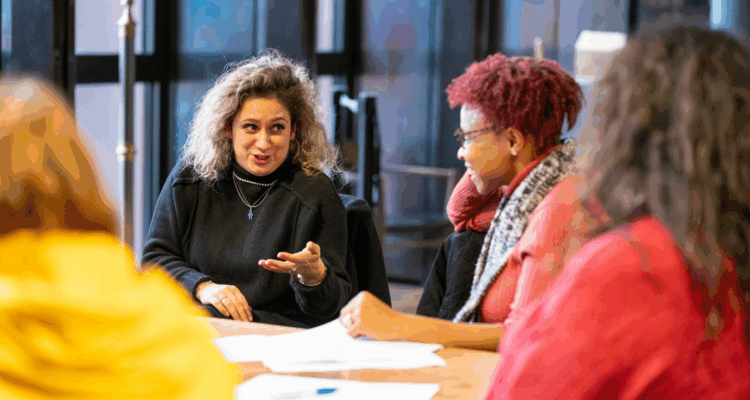On first Looking Into Shakespeare
Megg Hewlett, who has been trained by The Reader Organisation runs shared reading groups in Kensington and Chelsea Libraries. Over the next three weeks, she tells us about facing her fear of reading Shakespeare.
Lessons for the terrified on reading Shakespeare with a group
Shakespeare has mostly terrified me as a reader. The few times I tried to read him I felt all my inadequacies loom before me in their hugest possible forms. I’m no good, my intellect is rubbish, I can only manage simple things, people will see I am stupid, the list goes on!
Last year I set myself a goal to read some Shakespeare. I read The Winter's Tale with two other people, The Merchant of Venice in a small group of three or four people and Macbeth on my own. I followed up all the readings with viewing the play either at the theatre or on film.
It was hard, and I did not understand all of it easily – probably some of it at all. I would benefit from second and third readings of each – but I have learnt that anything worth reading is worth reading again and that fuller understanding and enjoyment would be the gain of doing so. I can imagine reading them again – they were good.
So far, in my role as a facilitator of Get Into Reading groups, I have only tackled Shakespeare in poem form or short excerpts from his plays. The thought of reading a play with a group has terrified me. People will see I am no good at this and finally they will realise I am a fake!
So it was with much anxiety that I suggested to the group that we read Much Ado About Nothing. We are likely to have the opportunity to attend a performance at the Globe Theatre in September and I hoped that group members might be keen to read it before we went. Also, the group has read quite a range of material yet not really anything very difficult and I hoped that they might feel a real sense of achievement if we did read Shakespeare.
Some of the novels the group has previously read include Of Mice and Men, The Uncommon Reader, Silas Marner, The End of the Affair and, most recently, The Mayor Of Casterbridge. We have also read some plays including An Inspector Calls and All My Sons.
The group meets in a library and has a regular core of around eight or nine people who attend most weeks with some others coming more infrequently. It is an open group so it has people who come as they have seen notices promoting the group and it sounds of interest. Others are referred by mental health workers, occupational therapists or drug and alcohol agencies. The range of confidence with literature varies greatly, from those with an English degree to one member who tells us she has severe dyslexia and is only learning to read now (in her 40’s).
Not everybody was excited about the idea. However, fortunately, some people were very keen. We took time to discuss the possibility. One woman said ‘I’ve never read any Shakespeare so for that reason I’d like to do it’. Another person pointed out that we have a person with English as a second language and that he would find it difficult. I agreed with her and asked this person what his thoughts were. He said he found all reading in English challenging but would be happy to join us anyway as he thought he would get something worthwhile from the experience, as he had from everything else we had read together. Another woman told us she would really like to do it as she was doing GCSE English and had to do some Shakespeare for that and thought it might be helpful for her.
Agreement was arrived at and the following week we started.
Session One:
The turnout to the group was good – ten people. Even those who had not been that keen came – phew! They are still with me. I was nervous and anxious and I know it showed.
Some of the group had been at the event last year in which Ben Crystal gave us a mini workshop presentation on Comedy of Errors immediately before we saw the play in Regents Park. I reminded people that he said it is supposed to be fun and not to try to understand everything. This was like being given permission not to stress – very helpful!
It seemed important to begin by stating some ideas that would underpin our endeavour. So I started with a little ‘speech’ stating:
- We will go slowly, there is no need to hurry
- No question is a bad/stupid question – if you want to know something ask and someone in the group will most likely be able to help
- Its ok not to understand it all, in fact don’t expect to do so – some people spend years studying it, we are reading it once
- It is likely to feel hard but we have the benefit of the group to help us
I handed out photocopies of the character list and also a very brief synopsis on each scene. I decided that certainty and clarity would win out over anticipation and mystery in this case! People were very keen on this and seemed to find having something to hold on to very reassuring.
So off we went.
We read the first twenty five lines and stopped. Pretty straight forward. A quick summary of the content; Don Pedro is arriving soon with Claudio from the war. Claudio’s uncle sheds tears of joy at his nephew’s good report. John says to the group:
what a beautiful line…'how lovely it is to weep at joy than to joy at weeping’.
I start to relax and breathe… maybe we can do this? Maybe it will be ok. We read on.
Scene One is quite long and takes us some time. When we finish I suggest maybe that is enough for the day and we should read the poem but someone says:
The next scene is very short can we read it?
So we are off again. And it is good. The tension in the play is building. We, as readers, are understanding the action and are getting interested. It is harder than we are used to but we are managing and it is not so hard we can’t understand at all. And we have enjoyed ourselves. Perhaps there is not much more we can ask?
The readers enunciate clearly and are measured and well paced, impressive in fact and most people do volunteer to read, even Barbara who has never read before! She says ‘give me a big part’ but when we come to choose a role she opts for a small one which she manages well.
In choosing a poem my thoughts were to pick something related in theme but also relatively simple in content. We read 'The Secret' by John Clare. And then they ask for a second poem. I look at the clock and think, ok lets squeeze it in and I give the 'Pretty Words' by Elinor Wylie. We read it and two people say simultaneously, "wow", and one says, "that is so fantastic’. "Yes", I think, "I agree". This gift of words is fantastic.
Peter ends the session by saying:
Things like Eliot, Shakespeare and Hardy seemed grand and unapproachable to me before but now I wonder why I have not had it all my life as it is so good.
Share
Related Articles

Shared Reading in Wirral Libraries: ‘As a kid people read stories to you but as an adult you lose that – and it’s a fantastic thing to do!’
Two Strategic Librarians for Wirral Libraries, Kathleen McKean and Diane Mitchell have been working in partnership with the UK’s largest…

Pat: ‘You don’t need to be an academic – it’s about going on your gut feeling about a story or poem’
National charity The Reader runs two popular weekly 90-minute Shared Reading group at one of the UK’s most innovative libraries,…

Sue: ‘I like the fact you’re not judged by anyone, we have a laugh and learn a lot from each other’
National wellbeing charity The Reader is celebrating the first year of a second weekly Shared Reading group at one of the…


